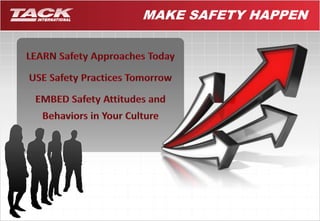Safety Slide Show
- 1. MAKE SAFETY HAPPEN Safety
- 3. MAKE SAFETY HAPPEN GOALS 1. STRENGTHENING YOUR SAFETY CULTURE — Placing a focus on safety means profitability, productivity, and quality will also improve. Reinforcing the perception of Safety as a cultural value rather than simply as a corporate prescription. Developing a shared and sustainable attitude about safety and prevention that succeeds because it is team INTERdependent. 2. SPEAKING OUT ABOUT SAFETY — Little things add up — so, everyone must take control when 3 they see hazards and near misses. Building and sharing a positive and proactive meaning means being willing to talk about safety hazards and near misses. Taking control to create an internal conversation that sustains and reinforces our safety culture day by day. 3. MOTIVATING SAFETY — Everyone must take ownership for making safety happen. • Sharing the importance and the impact of individual roles, attitudes, behaviors on safety culture with everyone taking responsibility for prevention. Finding intrinsic motivation to act safe in order to positively influence Health and Safety.
- 4. 3D SAFETY CULTURE MODEL A ROBUST SAFETY CULTURE CONTAINS THE KNOW-HOW, ATTITUDES, AND BEHAVIORS — SHARED, PURSUED, AND REINFORCED BY EVERYONE IN THREE DIMENSIONS. COGNITIVE DIMENSION Knowing and perceiving SOCIAL 4 DIMENSION Sharing and Speaking Out OPERATIONAL DIMENSION Developing and Improving What do we need to communicate in order to reinforce our safety culture? How to give and receive feedback on safe and unsafe behaviors How to share near miss and behavioral report forms to improve our behavior and attitudes What can we do to concretely improve safety in everyday life? Individual Action plans Team projects shared with top management Design of organizational safety What do I need to know about safety? Risks, hazards, accident chains, safety culture definitions OSHA and local regulations; organizational tools, and procedures Risk perception and evaluation
- 5. I’ll follow rules because I believe it’s right for me personally, and I don’t want to get hurt. 5 I’ll make sure we all follow the rules because I believe it’s right, and because it’s really the only way for all of us to be safe. OUR safety is my responsibility. % INJURIES I’ll follow rules because I must or to avoid penalties. EXTERNAL EXTERNAL and INTERNAL INTERNAL SAFETY ACTIONS are EXTRINSICALLY MOTIVATED SAFETY ACTIONS are BOTH EXTRINSICALLY AND INTRINSICALLY MOTIVATED SAFETY ACTIONS are INTRINSICALLY MOTIVATED Locus of control Motivation DUPONT BRADLEY CURVE Where are we positioned, as staff members and as an organization? What can we do in order to move towards team INTERdependence?
- 6. SAMPLE PROJECT ACTIVITIES 6 1. DIRECTORS 2. SUPERVISORS & MIDDLE MANAGERS 5. HOW TO BE SAFETY CHAMPIONS SAFETY VISION & OPERATIVE GUIDELINES 3. WHITE COLLAR 4. BLUE COLLAR SAFETY ACTION PLANS 7. SAFETY CHAMPIONS: PROJECT TEAMS SAFETY PROJECTS 8. ROUND TABLES with TOP MGMT 6. INTER-SITE INSPECTION SAFETY POSTCARDS SAFETY TRAFFIC LIGHT
- 7. ON-GOING SAMPLE PROJECT “MAKE SAFETY HAPPEN” SAFETY DAYS: Safety Day is an Inspirational initiative, aimed to create momentum about the safety culture. A Safety Day, addressed to a large number of people, is focused on a specific topic and is delivered through the use of a powerful and inspirational metaphor. For example: 7 DYI – create our company ‘to be’ safety culture as a town! DRUMSSTORMING – how can we be interdependent? let’s harmonize! ADV – what’s the main message about safety culture? Let’s advertize!! ACTIVITIES
- 8. 1. Cognitive Behavioral Approach Practical focus Real-time application Workplace culture embedding Behavioral based Linked to communication skills TACK’S SAFETY CAPACITY 2. Safety Expertise Breadth Depth Proven approaches, processes, solutions, tools, and measures 3. Experience Proven global success record Across cultures and sectors Factories, retail, and administration, energy, pharma,
- 10. Experienced Consultants and Facilitators TACK consultants are equipped to develop world-class safety development processes and learning journeys TACK facilitators are experienced in the world of business and are engaging communication experts TACK’S CAPACITY TO DELIVER THE LANGUAGE OF SAFETY Instructional Designers TACK has an in-house instructional design team that is supported by our own expert safety Instructional Designers Rich Tool-Kit TACK has a Rich Toolkit from which we can draw appropriate tools for each project in order to design exceptionally innovative and practical blended SAFETY solutions
- 11. Thank you!










